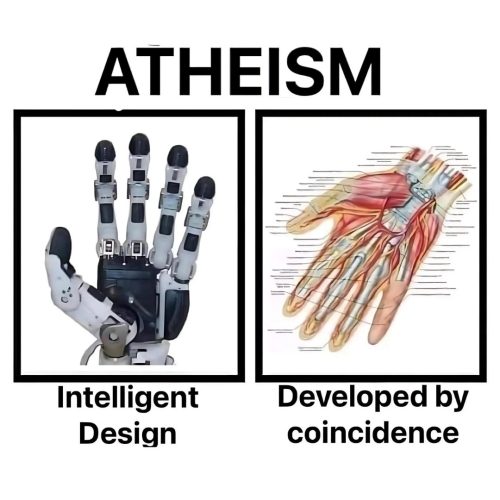Did you hear about the co-founder of Wikipedia–the world’s largest accessible source of information? 3 months ago, Larry Sanger posted in his blog, “How a Skeptical Philosopher Becomes a Christian,” about his 35-year journey from agnosticism to faith. Though he went to church as a child, he stopped believing in God around 14 or 15 due to nagging questions & becoming disillusioned by Christians who brushed him off.
He adopted a rationalistic approach to knowledge. With a Ph.D. in philosophy, he immersed himself in analytic philosophy–a field dominated by atheists & agnostics–& taught philosophy courses. Despite his skepticism, Sanger remained open to the possibility of God’s existence. He also became equally disillusioned by academia’s lack of real truth-seeking & the often hostile attitudes against Christians.
He says, “Some of my favorite people were Christian, too. And some of them were extremely intelligent.” He began to re-examine rational arguments for God’s existence, such as the cosmological & fine-tuning arguments (that the universe requires a first cause & intelligent designer) presented by apologists like Stephen Meyer. Sanger thought: “Maybe, just maybe, I too had been indoctrinated, in a way. Perhaps I had misunderstood things, I only thought I had understood. In short, perhaps, I had not given Christianity a fair shake.”
Like Sanger, Meyer is a brilliant man. His argument posits that the universe’s complex & precise physical constants (like the gravitational constant, electromagnetic force, & strong nuclear force) & conditions (like the rate of expansion post-Big Bang) set such extremely narrow ranges to allow for life that the best explanation is a divine designer. If any of those fundamental constants or conditions experience even a minuscule deviation, life or even the universe itself could not exist. In other words, it’s a Goldilocks universe that’s “just right”–perfectly suited for human life on earth.
Around 2010, Sanger exposed his 2 sons to the Bible because “it is, after all, the most influential book in the history of the world, bar none. One cannot call oneself well educated in the West if one has not read it.” Sanger was intrigued by it, but “assumed there wasn’t anything terribly deep to understand.” He can now admit he did not understand very well what he was reading then.
By 2020, Sanger started reading the Bible more seriously & studying it thoroughly. He said: “When I really sought to understand it, I found the Bible far more interesting and–to my shock & consternation–coherent than I was expecting.” As he looked up answers to his critical questions, he found the answers were “shockingly plausible,” & that the Bible could withstand interrogation. “I found myself positively ashamed to realize that, despite having a Ph.D. in philosophy, I had never really understood what theology even is.”
Agnosticism isn’t a coherent position because its arguments are circular & self-defeating. Not only is it irrational to deny & suppress obvious truths seen in nature & known intuitively by the conscience (Romans 1 & 2), but it does so by reasoning with a brain that cannot be trusted. If the brain’s thoughts are just the result of naturalistic causes, how can it be trusted? Your brain is telling you that you can trust its conclusions. Why? Because your brain says so! But how can anyone appeal to the authority of a mass of undesigned molecules?
Atheism puts its quasi-religious faith in unprovable & impossible “miracles.” Its blind faith statements would include:
- Matter was produced by non-matter. The universe had a beginning (aka Big Bang), but no one can account for how something came from nothing.
- Life was produced by non-life. The massively complex DNA of biological life somehow just appeared.
- Order was produced by disorder (given massive amounts of time). Though contradicting the law of entropy & the 2nd law of Thermodynamics, the Earth looks intentionally finely-tuned for life, but it can’t be.
If nothing produced everything, non-life produced life, & chaos produced design, it’s still impossible for physical matter to produce the immaterial realities of human consciousness, morality, & beliefs which exist outside of mere brain matter. Unbelievers still expect benevolent behaviors, & expect others to agree with their subjective notions of morality. But who says your standards are the right or best ones? Without an objective standard of morality (God), there is no “should” or “ought to.”
While science can make discoveries about physical realities, philosophy cannot discover metaphysical realities. Only God can do that. Sanger’s appreciation of Christians’ graciousness & his gradual warming up to faith culminated in his acceptance of Christianity. He’s now adept at dismantling agnostic arguments & defending the faith, encouraging others to explore the Bible & Christian arguments with an open mind.
There’s a difference between knowledge & wisdom. A person can be smart, but foolish (Ps. 14:1, Rom. 1:22). Wikipedia is full of knowledge, but because its source is human, some is inaccurate or biased. Only the Bible offers infallible divine wisdom that leads to salvation (2 Tim. 3:15).


